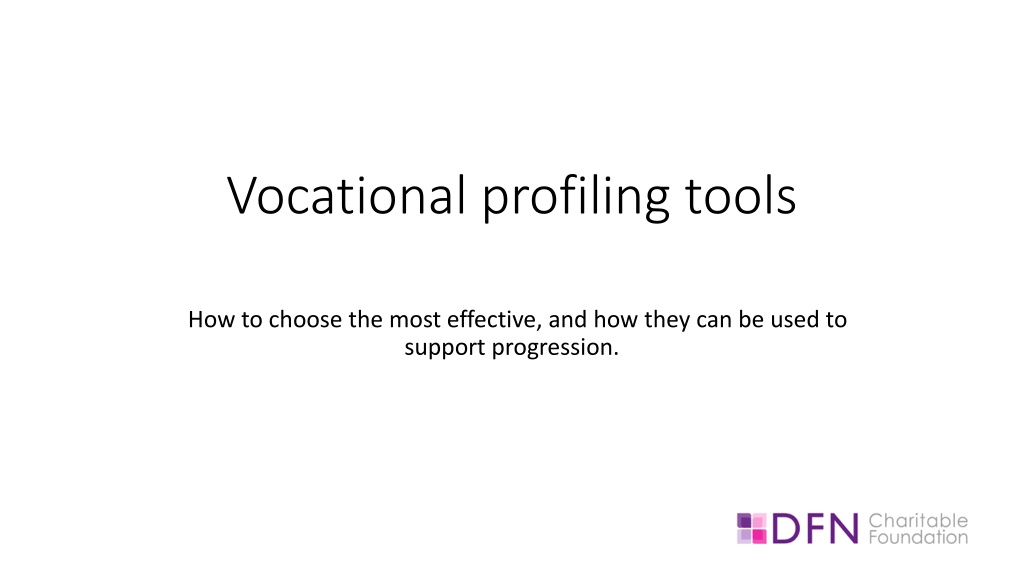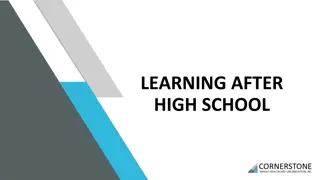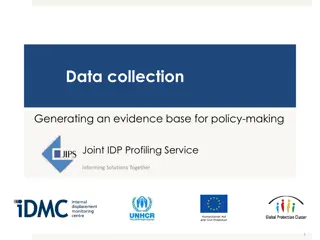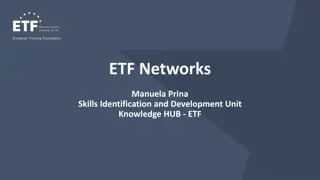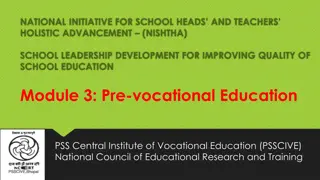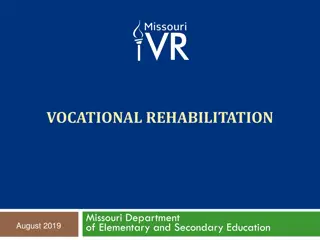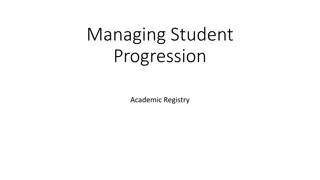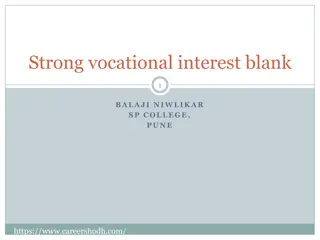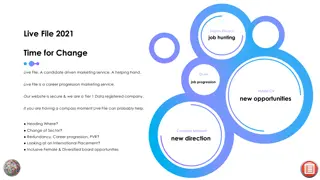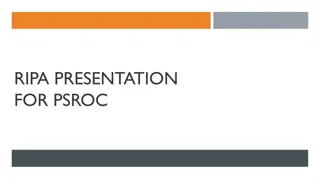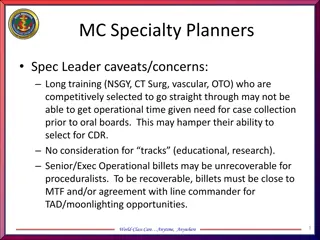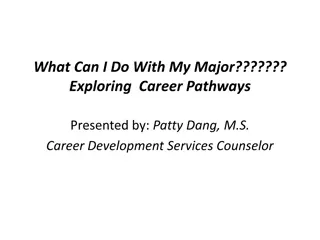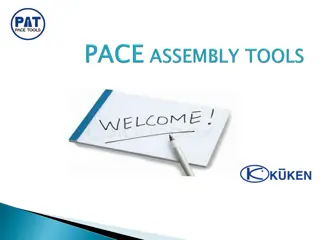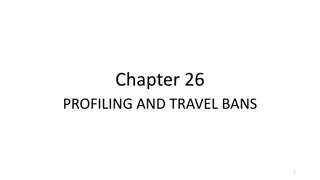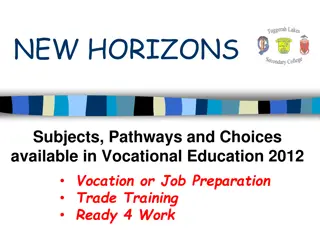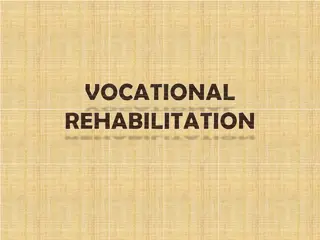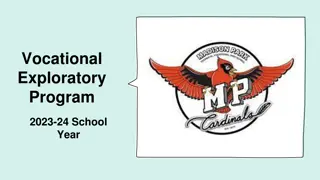Understanding Vocational Profiling Tools for Career Progression
Vocational profiling tools help assess individual skills, interests, and needs to support career decisions. Components include dreams, skills, learning styles, and support systems. Effective profiles focus on aspirations, talents, challenges, and solutions, guiding individuals towards suitable employment opportunities.
Download Presentation

Please find below an Image/Link to download the presentation.
The content on the website is provided AS IS for your information and personal use only. It may not be sold, licensed, or shared on other websites without obtaining consent from the author. Download presentation by click this link. If you encounter any issues during the download, it is possible that the publisher has removed the file from their server.
E N D
Presentation Transcript
Vocational profiling tools How to choose the most effective, and how they can be used to support progression.
What is a Vocational Profile? A vocational profile is a form of assessment to understand an individual s experience, skills, abilities, interests, aspirations and needs in relation to employment. The aim is to understand the person in depth and to allow for the best possible job match or work experience placement. It provides a picture of the ideal conditions needed in a workplace for the student to be successful. It is helpful to start working on a vocational profile from year 9 so that any information collected informs future choices - subjects, work experience, weekend or holiday job options as well as feeding into an Education, Health and Care (EHC) Plan if the young person has one. If there are existing student-centred planning documents, it will be important to ensure that any vocational profile used is complementary to them rather than simply duplicating information. The compiling of the vocational profile can be a part of the normal curriculum or tutorial time and should be agreed with the young person. The profile needs to be kept up to date as the student experiences the world of work. https://www.ndti.org.uk/
Typical Vocational Profile Components Dreams and Aspirations Existing Talents, Skills, Knowledge Interests Positive Personality Traits Environmental Preferences Learning Styles Specific Challenges, Creative Solutions & Adjustments (RAs) Dislikes Support System 3
How do the most effective profiles work? List as many points as possible. The more information provided, the more the student is helped to accurately define their preferred job goal over time and ensure it matches their interests and strengths. Dreams and Goals: What do you really want out of life and work? What would be fun and satisfying to you? Interests: What tasks or activities have you been most enthusiastic about, or have the most meaning for you? Why? Talents, Skills and Knowledge: What skills can you bring to the workplace? What new skills have you learned? Learning Styles: What works best when you need to learn new tasks? Positive Personality Traits: What traits do you have that help you be successful? Environmental Preferences: What about the environment helps you be successful? Are there things about an environment that make it more difficult e.g. hot/cold, noisy/quiet, fast/slow paced? Dislikes: Are there things about tasks or job settings that you do not like? Consider tasks at home, work experience, part-time jobs. Support System: With whom do you talk for support or honest feedback? Specific Challenges: What employability weakness or areas of inexperience do you have that could impact your job search? Creative Solutions to Your Challenges: What support or adjustments were helpful to get a task done? Are there tasks or situations you should avoid in order to manage your disability?
Why use a Vocational Profile to guide someone towards Employment? Having a job is not just the next step after leaving education. The right job is a good match for the person. If you have the right job, you: can get there easily do things you like and things you re good at work in places you re comfortable, with people you like become a valued colleague earn enough money Vocational Profiles help ensure a personalised and outcome-focused positive progression route to employment in the local community.
Tracking Progress over time using a Vocational Fit Assessment
Choose the most effective in school Vocational Profile for your student Keep a Vocational Profile list with your Year 11 student and make sure it moves and develops with the student Vocational Profile hand out attached Use a Centre for Mental Health IPS version as homework - https://www.centreformentalhealth.org.uk/5-vocational-profiling Use an easy-read profile with a family member, friend or job coach Preparing for Adulthood https://www.preparingforadulthood.org.uk/SiteAssets/Downloads/wpykaifl6 36379632195713341.pdf Use a family friendly format for completion at home Picture Profiling 4 hand out attached Vocational Fit Assessment Contact DFN Project SEARCH: Email info@dfnprojectsearch.org Tel 0203 955 5280
The role of the Job Coach Supported employment services can sometimes provide or train job coaches to get to know the student, discover their interests, skills and preferences and complete a Vocational Profile. Job coaches help find out about people before they start looking for a job or employment pathway. They get to know the person and people they know and trust, like: friends, family or neighbours people they ve worked with during work experiences or part time jobs teachers that they have now or used to have other people who support them If you use an external job coach, make sure they are attached to a successful supported employment service local to where the student lives so that they can continue to assist them as they progress through, finish school and begin to look for a job. Even if you don t use an external job coach, there may already be a vocational profile form in use by a service in your area supporting adults with learning disabilities to move into work. If your student is going to use their service in the future, make sure you gather the information they need.
For further Vocational Profiling Tools see: NDTi How to support young people with SEN and disabilities into work https://www.ndti.org.uk/uploads/files/How_to_Support_Young_People_With_Special_Educati onal_Needs_into_Work_FINAL.pdf Preparing for Adulthood Vocational Profile Workbook https://www.preparingforadulthood.org.uk/SiteAssets/Downloads/wpykaifl636379632195713341. pdf Ask your school, local college(s), Local Authority social worker(s), transition worker(s), or Job Centre Plus. Your local authority website provides information about what help there is to get a paid job https://www.gov.uk/find-local-council British Association for Supported Employment https://www.base-uk.org/ Engage To Change http://www.engagetochange.org.uk/
